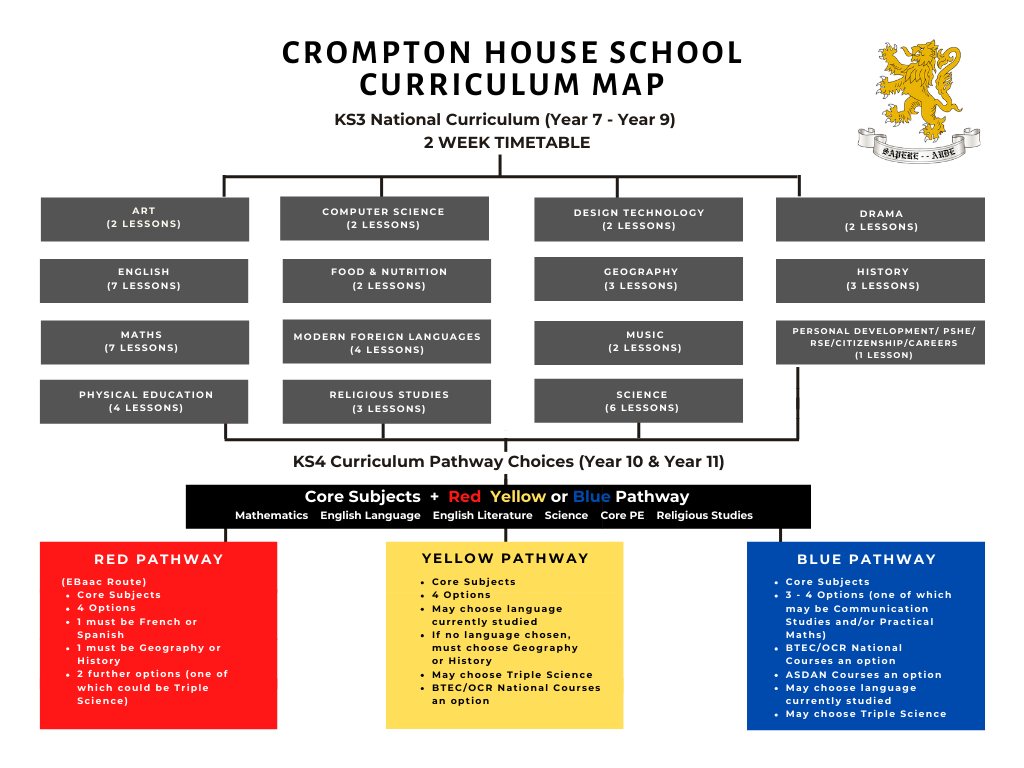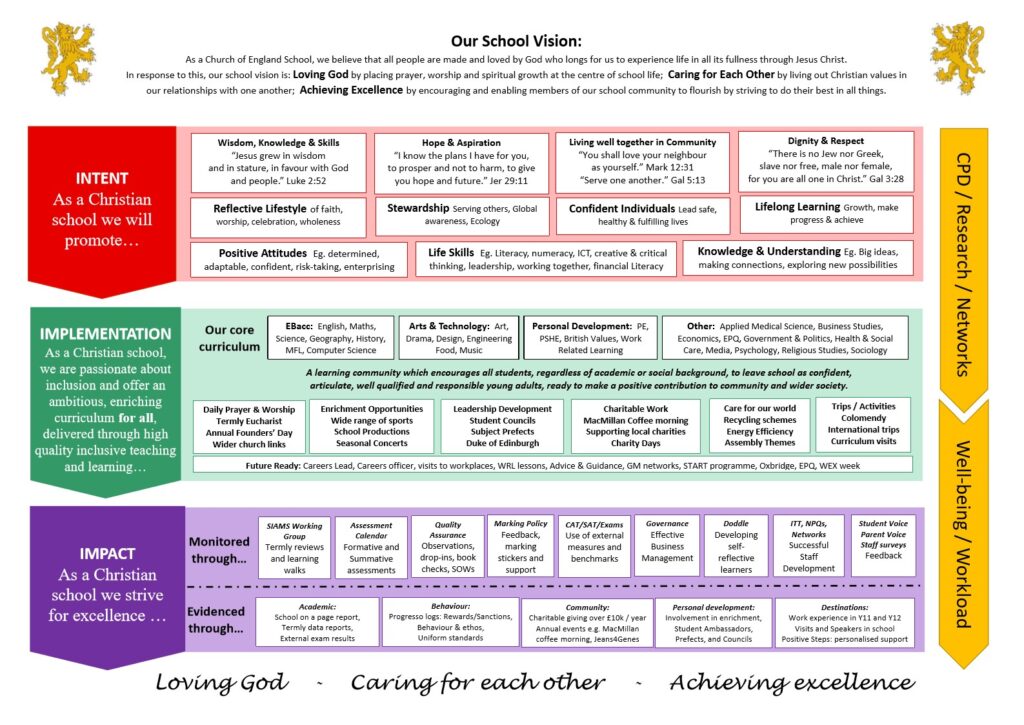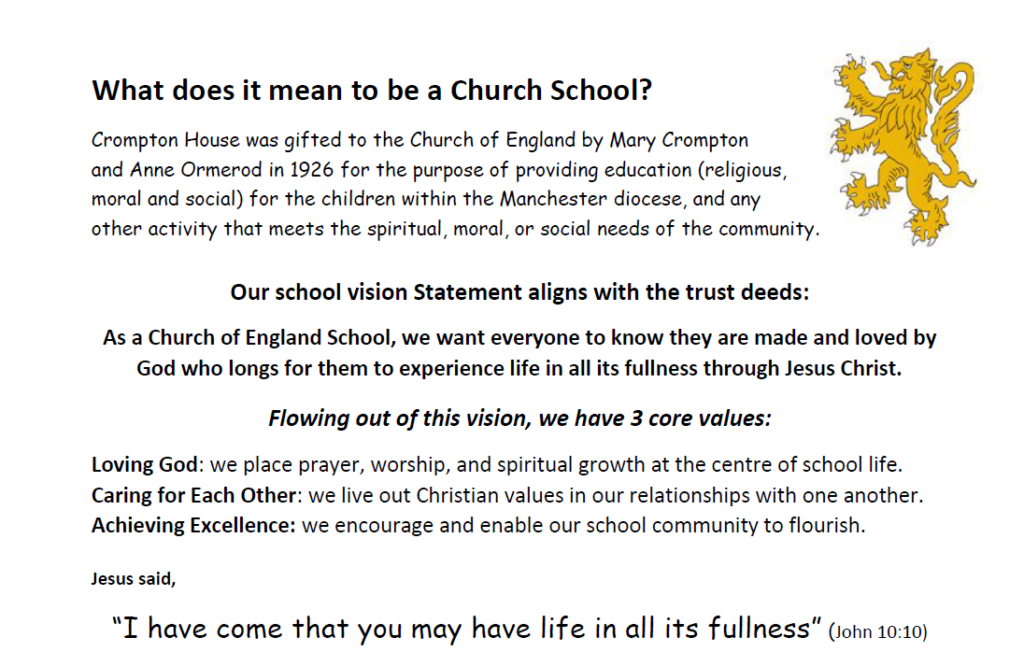PSHE/RSE
At Crompton House, we aim to prepare students for the changes to come across their life; this includes their time with us and the time beyond our doors. We want to equip students with the appropriate knowledge and skills needed to be able to know themselves and to understand and respond to other people. Students at Crompton House are guided to be curious about their world, be understanding of those they meet and to have a mindset that promotes our core values of Loving God, Caring for Each Other and Achieving Excellence.
Is There a Vision for PSHE and RSHE?
School Vision for PSHE
- It is our goal to promote a high quality and holistic education for all pupils; this includes their academic learning and their personal development.
- We want our students to be equipped with the skills they need and to be ambitious in their goals.
- We want our students to be not only risk-takers but resourceful and tenacious students who rise to a challenge and can be imaginative and resilient in their approach to new learning.
- We want our students to be interesting as well as interested and to be enthusiastic discoverers of new learning.
- We want our students to be brave and motivated to be the best that they can be and to be able to thrive as individuals and develop their own independence. We will promote this vision through the learning culture that we will instil within our students through their experiences within the classroom and beyond. We will provide a curriculum that is broad and varied and accessible to all learners, and which takes into account the individuality of our students.
- We will achieve this through our dedication to embracing new ideas and ensuring that our curriculum and teaching styles are constantly developed and honed.
- We want to promote our core Christian values as a Church of England School throughout our PSHE lessons.
- British Values are an integral part of our community cohesion. We believe that British Values are Our Values and encourage students to think about their behaviour in this way.
RSHE Vision:
- Encourage pupils to develop the knowledge, skills and attributes they need to keep themselves healthy and safe, and prepared for life and work in modern Britain.
- RSHE is the lifelong learning about physical, moral, social and emotional development. It is about the understanding of the importance of stable and loving relationships, family, respect, love and care.
- RSHE is a place for students to explore their identity and learn about others who are different to themselves.
- RSHE lessons promote respect for other people, help to celebrate our differences and encourage students to branch out in their thinking.
How has the Curriculum Content Been Selected and How Does this Reflect the Vision?
Our curriculum is planned using the Department for Education Statutory Guidelines for RSHE and Health education; this is combined with planning support from the PSHE Association to ensure we provide accurate information to our young people and meet the National expectations placed upon us.
Our curriculum content is fluid. This means it is ever changing to reflect the needs and interests of our young people. We use national and local health statistics to identify current needs of students (e.g., information regarding vaping and energy drinks.) We also adapt our curriculum as changes are introduced in National Law (e.g., changes to the Marriage Act in 2023) and School Policy (if necessary).
Our curriculum also relies on the feedback and input from Students, Staff and Parents. At the end of each unit, students and staff are asked to reflect on the topics and provide any thoughts or suggestions. This informs further planning- this could be later in the term or planning for the next academic year. Parents are also consulted and the new Parent Planning Group will be created in the 2022/2023 academic year.
This reflects our vision because it ensures our curriculum is relevant and reflective of the needs and wishes of our young people and their families. Our goal is to create a holistic curriculum which prepares students for later life, this can only be achieved if we listen to their needs and are flexible in our approach.
How Clearly are the Expectations and Goals Built into the Curriculum?
Each topic booklet contains PLC statements which clearly outline the expected learning. Each lesson has a WALT statement and students are asked to reflect on their learning regularly. Teachers create ground rules with students and work to create an open, honest and safe space for learning about sensitive concepts.
We use all available resources and teaching strategies to ensure that students have a comprehensive knowledge of the Statutory Guidance from the Department of Education (as well as additional content we feel is necessary and appropriate for our young people). Although PSHE is not an externally examined subject, lessons are focused on embedding challenge, metacognition, memory techniques, numeracy and literacy into our departmental curriculum.
To complement the schemes of work students also have Drop Down Days to embed skills, raise awareness of a particular topic or to promote character building. These days are designed to enrich our students.
How good is teachers’ knowledge of PSHE and RSHE?
Our form teachers are our core teaching team for PSHE and RSHE. We appreciate that their knowledge of certain topics may not be specialised and this is supported through our innovation calendar, where teachers can receive information from specialists to improve their confidence in teaching PSHE. Furthermore, a Teacher Information Zone will be completed by the end of the 2022/23 year, this will provide lots of information and training support for form teachers. We intent to create a Parent Information Zone to follow this.
How is PSHE and RSHE Assessed?
PSHE and RSHE cannot always be quantified, some skills (such as empathy), are built over time and may present more challenges to some students than others. However, we believe that some core knowledge can be built during PSHE and RSHE lessons (e.g., basic first aid knowledge). These are assessed in a low-pressure environment via quick check tasks in lessons (e.g., fill in the tasks), and short end-of-topic quizzes at the back of each booklet. Some are also posted to Doddle.
Reflection is an important part of PSHE and RSHE. Students are provided with PLC statements for each topic and are encouraged to reflect on their learning at the end of each booklet- have they learned anything new? Why did we cover this topic? How would you change/adapt this topic if you could do so? These reflection questions are for students to judge their own progress, but they are also a chance for staff to reflect on the lessons and adapt for the future.
How do high-quality resources support learning?
Lessons are created and disseminated to all staff in a timely manner. Staff are encouraged to visit materials before they are needed and to make and changes to allow them to be accessed easily by their students. The Head of Subject works in a Multi-Agency Team with the SENDCO, School Safeguarding Lead, Charities and the Local Authority, to ensure that all materials are accurate and engaging.
We listen keenly to pupil voice from students in Years 7-11, and have been flexible in our approach to support them. For example, Year 11 in 2020 asked that the curriculum covered more about Debt, Credit, Pensions and Mortgages. This has now been embedded into our curriculum, building on the work covered in Work Related Learning in KS3. Furthermore, pupils wanted more information about Defibrillators; we now cover how to use them and ensure that we signpost where they can be found in school.
We have also embedded focus on national days such as Mental Health Awareness week and LGBTQ+ Month in PSHE lessons. The curriculum is deliberately planned to enable pupils to revisit core themes and deepen understanding. Retrieval of relevant prior learning at the start of core theme aims to embed these concepts. In order to help recall this information ‘low stakes testing’ is used in the form of diagnostic tests, which does not just help measure understanding, it also develops understanding. Tier 2 and tier 3 subject specific vocabulary is taught and modelled by PSHE teachers. Pupils are expected to use this vocabulary in both oral and written answers. Knowledge organisers contain vocabulary lists to help deepen the knowledge and understanding of key terminology. Pupils are assessed through multiple choice diagnostic testing which are built into each unit of work and challenge all abilities throughout Key Stage 3. This identifies gaps and misunderstandings in knowledge. This allows to compare where a pupil is at the end of a unit against where they were at the beginning. The benchmark against which progress is measured is the pupil’s own starting point, not the performance of others.





